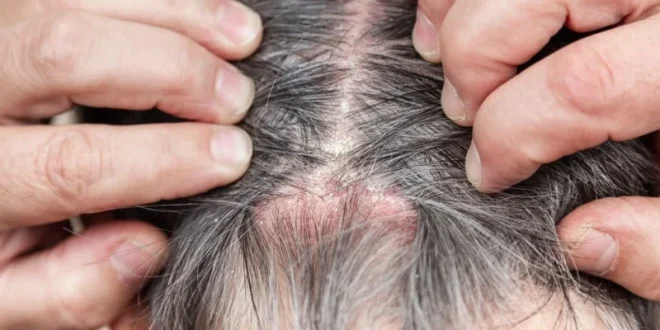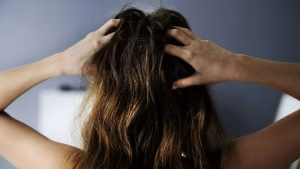
Is there a relationship between itchy scalp and hair loss?
You may experience itching on your scalp and hair loss at the same time. This may be related to certain health conditions. We tell you what can cause itchy scalp and hair loss.
Itchy skin can make focusing difficult. Sometimes it’s accompanied by alopecia, which is characterized by partial or complete loss of hair from normal growth in parts of the body, including the head. The combination of an itchy scalp and hair loss can be caused by health issues like eczema or scalp ringworm. Your hormones can also play a role in both of these issues. Getting rid of an itchy scalp and hair loss starts with finding the cause. Read on to find out what can cause your scalp and hair to itch at the same time.

What causes itchy scalp and hair loss?
Scalp hair loss can be caused by many things. The reasons are:
1. Atopic dermatitis (eczema)
Atopic dermatitis or eczema is a type of skin disease that affects the scalp. It causes redness, itching and peeling. Severe scratching can also cause hair loss.
2. Sensitive scalp
A 2018 review published in the journal Cutaneous Adnexal Diseases found that 60% of people with scalp sensitivity had itching, which is characterized by burning or stinging of the scalp. Hair loss is also associated with scalp sensitivity.
3. Alopecia Areata
Alopecia Areata is an autoimmune disease characterized by hair loss. This occurs when the body’s immune system mistakenly attacks hair follicles, causing hair loss and possibly scalp irritation.
4. Tinea capitis
Tinea capitis or tinea capitis is a fungal infection of the scalp. The cause of this disease is dermatophytes. It causes itching, redness, peeling and hair loss in the affected area. Experts say that in severe cases, ringworm can cause permanent hair loss.

5. Blue lichen
Lichen planus is a rare disease that affects hair follicles, causing scarring and hair loss. It causes itching, burning and tenderness on the scalp, causing thinning of hair and bald areas.
6. Contact dermatitis
Contact dermatitis occurs when the skin comes into contact with an irritant or allergen, causing swelling and itching. Possible causes include hair products, dyes, and chemicals used on the scalp. Experts say long-term exposure to these chemicals will cause hair loss.
7. Folliculitis
Folliculitis is a bacterial or fungal infection of the hair follicles, causing pain, redness, itching, and sometimes hair loss. It can occur on the scalp and other parts of the body, especially in people with weak immune systems.
8. Hormone imbalance
Changes in estrogen and testosterone levels can cause scalp irritation and hair loss. Hormonal changes can affect the hair growth cycle, causing hair thinning or loss as well as itching.
9. Nutritional deficiency
Nutrient deficiencies such as vitamins and proteins can affect the health of the scalp and hair follicles. Deficiencies in nutrients such as iron, zinc, vitamin D and B complex vitamins can cause itchy scalp and hair loss.
10. Dandruff
Dandruff is a condition that causes the skin on the scalp to flake, causing irritation. This condition is rare but can also cause hair loss. This only happens if someone goes untreated and scratches their scalp frequently.

How to treat hair and itchy scalp
Medications and home remedies can help treat hair loss and reduce itchy scalp symptoms.
1. Minoxidil
Minoxidil is a topical cream that promotes hair growth and slows down balding. It works by dilating blood vessels in the scalp, increasing blood flow to hair follicles and promoting hair growth.
2. Finasteride
Finasteride is an oral medication that inhibits the enzyme that converts testosterone to dihydrotestosterone (DHT). Finasteride helps slow hair loss by reducing DHT in the scalp and may promote hair regrowth in some people.
3. Corticosteroids
Corticosteroids are anti-inflammatory drugs that can be applied topically, injected, or taken orally. They are used to reduce pain and itching associated with conditions such as psoriasis, eczema, and alopecia areata. Corticosteroids work by suppressing the body’s immune system and reducing scalp inflammation.
4. Antibiotics and Antifungals
Antibiotics and antifungals are used to treat bacterial or fungal infections of the scalp, such as folliculitis or tinea capitis. This medication works by targeting and destroying microbial cells, thus relieving the symptoms of itching and hair loss.
5. Coconut oil
Coconut oil is a good moisturizer, especially suitable for people with dry scalp. It nourishes the scalp, strengthens hair follicles and prevents hair breakage.
6. Tea tree oil
Tea tree oil is widely used in skin and hair care products due to its antifungal and antibacterial properties. Experts say it can target bacteria on the scalp that can cause itching and dandruff.
Do a clinical trial before applying natural ingredients to your scalp.
Scalp and hair loss can be caused by a variety of reasons, such as dandruff and eczema. Medications and home remedies can help prevent ingrown hairs and itchy scalps, but if you experience persistent scalp problems or severe hair loss, talk to your doctor.
